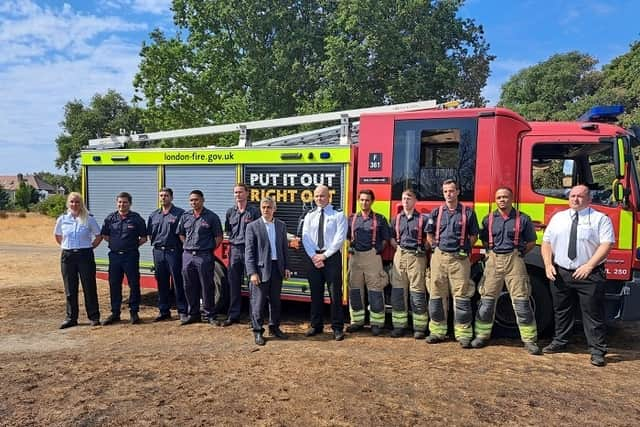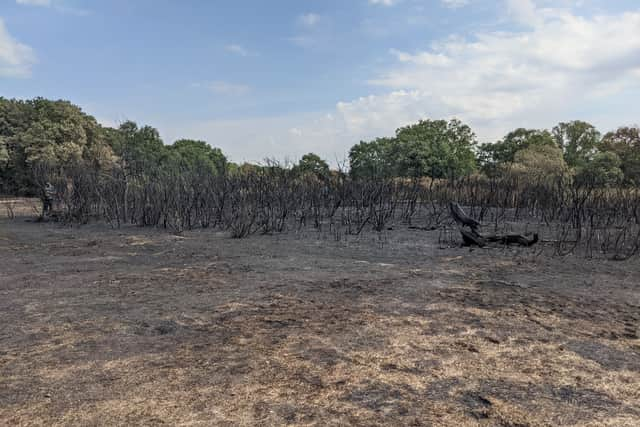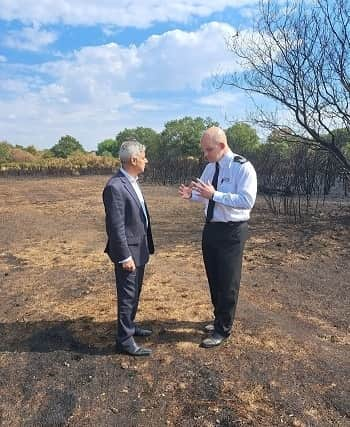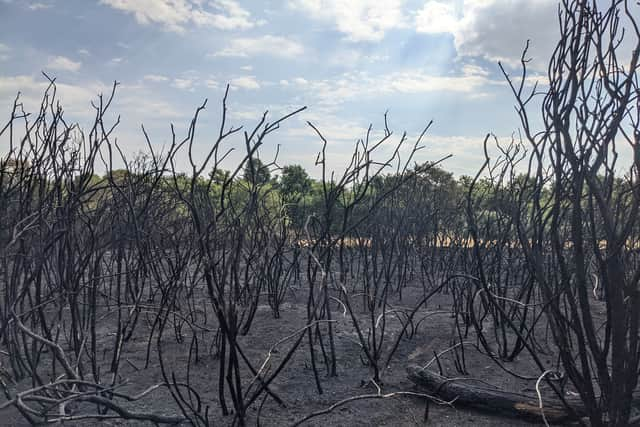Sadiq Khan: London wildfire risk will continue ‘until grass is green again’
and live on Freeview channel 276
Sadiq Khan has warned that there will be a continued risk of wildfires in London until the grass in the capital is green again.
This comes as the London Fire Brigade has seen a 128% increase in grass fires this year compared to last, with officers receiving 3,395 calls over the weekend (August 13-14)
Advertisement
Hide AdAdvertisement
Hide Ad

Last week there were two large grass fires in Leytonstone near Hollow Ponds, resulting in several hectares of grassland being destroyed.
While visiting the site at Epping Forest yesterday (Monday, August 15), mayor Mr Khan warned wildfires are the direct consequences of climate change.
“We had last month in July the driest month our city has experienced since 1935, this year will be the driest year since 1976,” he told LondonWorld.
Advertisement
Hide AdAdvertisement
Hide Ad“Just this weekend our brave firefighters dealt with more than 200 grass fires in urban London.
“That’s 10 times the amount of fires compared to last year.


“We need to be prepared for these conditions to continue for quite some time.
“Until the grass is green, there is still the possibility of grass fires, of open fires, so let’s make sure we do what we can to minimise work for the fire service and help them out during this difficult time.”
Although we are expecting rainfall this week, the London Fire Brigade has warned Londoners to not become complacent.
Advertisement
Hide AdAdvertisement
Hide AdThe service warns that the ground is still very dry and there is now a wind that could cause fires to spread more quickly.


Assistant Commissioner Jonathan Smith says the UK has never seen conditions like this before.
“In my 23 year career in the fire and rescue service I’ve never known a period where we’ve had a lack of rain for such a sustained period of time,” he told LondonWorld.
Advertisement
Hide AdAdvertisement
Hide Ad“It’s also operating in the temperatures that we’ve seen, so on July 19 we had firefighters operating in 40 degree heat, over the weekend we saw firefighters operating anywhere between 30 and 36 degrees.
“We’re replenishing those crews, we’re supplying them with fresh water and sugar and salt solution so they remain hydrated.
“But this is a challenge we’ve not seen in this way in the UK before.
“We’ve often looked at France, or Portugal, or Spain, or the States and seen what real wild land and grassland fires look like but we’ve not seen anything in comparison to that in the UK.
Advertisement
Hide AdAdvertisement
Hide Ad“What I think we will learn over the next six to eight weeks is that this is something all emergency services need to prepare for both now and in the future.”


Mr Khan added that there are several ways we can support our fire service.
“There’s things we can do to make life easier for the fire brigade: by being responsible with disposing of litter, glass bottles, when we’re at the park, at the common, by not having barbecues in open parks or on balconies and not using disposable barbecues in these types of temperatures.
“If you see a small fire ring 999 as these fires can spread quickly.
Advertisement
Hide AdAdvertisement
Hide Ad“We should be using water less. The advice from Thames Water and other environment agencies is to have shorter showers, think about what you’re using water for.
“The reality is our reservoirs are going to stay at low levels and dry for some period now.
“Even though it may rain this week, this short period of rain isn’t going to make up for the lack of rain over the last few months.
Advertisement
Hide AdAdvertisement
Hide Ad“It’s really important for us to realise that this drought could be here for sometime and that’s why it’s really important we do what we can to minimise an extension of a hose pipe ban.”
Ways you can help prevent grass fires:
- Don’t drop cigarettes or anything that is burning on dry ground;
- Don’t drop cigarettes out of car windows, they may land on dry grass by the roadside;
- Don’t have barbecues in parks and public spaces;
- Never leave camp fires or barbecues unattended and extinguish them properly after you have finished using them;
- Position your barbecue on level ground and keep it well away from anything that may catch fire (sheds, fences, trees, tents etc);
- Do not barbecue on balconies, the wind may carry smouldering ash towards nearby grassland;
- If you’re barbecuing near dry grass have a bucket of water or sand nearby for emergency use;
- And be aware of children, animals, balls or anything else that may knock over barbecues, increasing the risk of grass fires.
Flash flooding advice:
- Save the Floodline number (0345 988 118) to your phone in case you need to report flooding in your area, or for advice if your home is flooded;
- Create a list of important contact details such as your insurance and utility companies and insurance providers;
- Make sure you know how to turn off your gas, water and electrical supplies in an emergency;
- Look out for your neighbours and if you have vulnerable neighbours, make sure they know what they need to do in an emergency;
- Put an emergency grab bag together, including items you would need if you had to leave your home, such as medication, important documents, etc;
- Use flood barriers to divert water away from your home and prevent it entering. You can buy devices online or from a hardware store;
- And consider what items you may want to move to a higher level to protect them from potential flooding.
Comment Guidelines
National World encourages reader discussion on our stories. User feedback, insights and back-and-forth exchanges add a rich layer of context to reporting. Please review our Community Guidelines before commenting.
